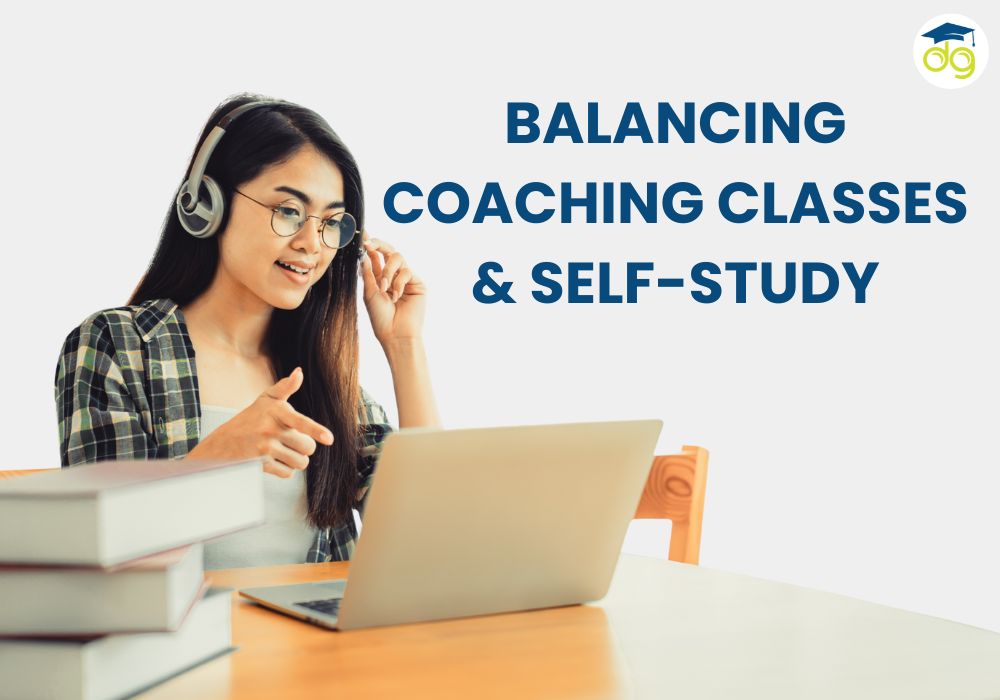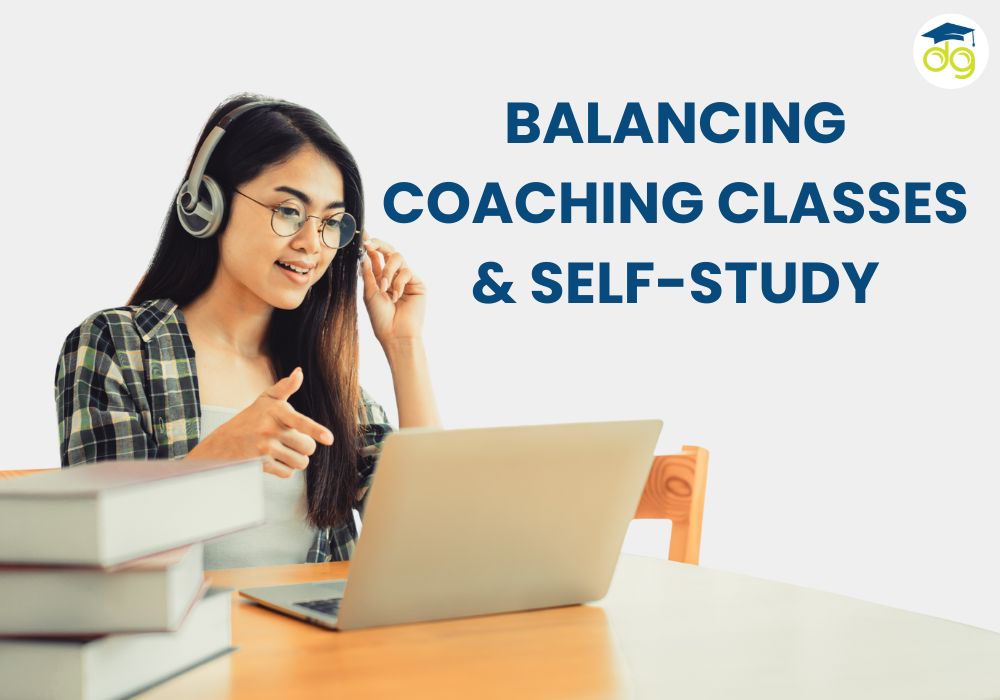Balancing Coaching Classes & Self-Study: Smart Tips for Students
Learn to balance coaching classes with self-study and ace your exams
Balancing Coaching Classes & Self-Study
In the current academic climate Students often end up trying to manage coaching classes and their own study. Coaching institutions provide structured direction however self-study can provide greater knowledge and retention. A lot of students struggle to find an equilibrium, and this inconsistency can cause frustration, anxiety and inefficiency during the preparation for exams.
Balance between studying on your own isn't an issue of choosing one or one over the other. It's the process of finding balance between self-directed learning and guided work. This blog discusses strategies for practical use to manage time studies plans as well as effective methods to assist students to prepare for tests in a confident manner.
Why Students Rely on Coaching Classes
The majority of students will find coaching classes are an essential system of support. This structured method ensures full curriculum coverage, knowledgeable teacher guidance, and access to peer groups that compete. Coaching provides test-taking and sessions for resolving doubts to increase confidence.
Coaching classes do have their some limitations. A long commute, rigid times, and dependence on the teacher may limit the time students can devote to personal studies. This is why the significance of managing time for students comes into play.
Simply put, coaching classes can provide guidance, however they are not able to replace personal efforts. People who take classes with no personal review often have difficulty retaining the concepts. Thus, balance is essential.
The Role of Self-Study in Success
The self-study component is at the heart of academic success. Although coaching classes can guide students, it's only by doing independent research that the concepts get easier to comprehend.
Benefits of studying on your own are:
- The ability to learn at one's own rate.
- Revisions multiple times to improve retention.
- Strengthening weak subjects.
- The development of critical thinking and problem-solving abilities.
The majority of top students say that their achievements did not result only from studying and a disciplined approach to self-study. Strategies for learning like taking notes, doing past year's papers as well as revising every day help strengthen the lessons learned in class.
Self-study without coaching is not enough. It is only when students commit the time and effort to learning can they gain confidence in themselves to pass examinations that are competitive.
Common Challenges Students Face
Balance between coaching and personal development is a lot easier said than done. The students often have challenges that include:
- Time-shortage: Long coaching hours and long travel times cut down on self-study time.
- Over-dependence: A lot of people rely upon their teachers' coaching instead of attempting to practice independently.
- Uncoordinated study schedule: Without a fixed schedule, the revision process is delayed.
- The effects of stress and fatigue: Working on multiple projects with coaching can lead to burnout.
Recognizing these obstacles is the initial step. Once they are aware of these obstacles and obstacles, they will be able to develop strategies for overcoming them.
How to Balance Coaching Classes and Self Study
The most frequent problem: how to balance self-study and coaching. It is all in scheduling and regularity.
Practical Tips:
- Review daily: Spend at least an hour re-reading the topics discussed in the coaching session on the same day.
- Prioritize: Focus more on weaknesses in the self-study.
- Use weekends to revise: Use Sundays for test-taking or study group sessions.
- Breaking Tasks: Divide large chapters into parts to help concentration.
- Use study groups to help you: Discuss doubts with your peers online if time is constrained.
Balance between the self-study process doesn't require lengthy hours of work However, it does require determination. Just 2-3 hours of regular studying at home every day will build a solid foundation.
Building the Right Study Plan
Many students ask which is the best study plan with coaching classes? The answer depends on the individual's learning style however, a couple of universal guidelines are attainable.
Steps to Create an Effective Study Plan:
- Breakfast: Revise the previous lesson of the day's coaching.
- Evening or Afternoon: Attend coaching sessions.
- After-Class: Solve practice questions that relate to subjects that are taught.
- Night: Quick review or the use of flashcards to learn.
For the sake of making it easier to follow Here is an example weekly study timetable:
Day | Coaching Hours | Self-Study Hours | Focus Area |
Mon | 4 | 3 | Revision of coaching, Mock test and Revise |
Tue | 3 | 4 | The subject is not as strong. |
Wed | 5 | 2 | Rapid revision and practice |
Thu | 4 | 3 | Test series + short Notes |
Fri | 3 | 4 | Exercises for problem-solving |
Sat | 5 | 3 | Study group / test online |
Sun | - | 6 | Weekly revision and mock test |
A study plan like this guarantees that neither coaching nor the study of oneself is left out. Students are able to modify this plan to meet their individual requirements.
Time Management Tips for Students
The primary skill required by students is to manage time efficiently. When coaching schedules have been established and scheduled, remaining time must be effectively planned out.
Useful Time Management Tips:
- Develop your own study timetable and follow the plan.
- Divide study sessions of two hours into 25-30-minute sessions.
- Make sure to prioritize subjects based on the upcoming tests for coaching.
- Make use of digital reminders and planners to prevent procrastination.
- Beware of distractions, such as notifications from mobile phones when you are studying.
If you are asked how can students manage time with coaching?, the answer is in discipline. Through setting achievable goals and reducing unnecessary hours, the students are able to manage both learning and coaching.
How many hours should one Do Self-Study with the help of tuition?
There's no one universal standard However, the experts advise:
- 2 hours per day when you are enrolled in full-time coaching.
- 4-6 hours daily during weekends or holidays.
- Concentrate on the quality of your study instead of merely minutes.
The importance of self-study is that it can be a supplement to coaching. Small, but effective training sessions can make an enormous impact.
Coaching vs Self Study: Which is Better?
It is true that both are distinct roles.
- Coaching: Offers professional guidance, exposure to a competitive setting and a structured syllabus covering.
- Self- Study: Develops self-confidence, autonomy, and long-term memory.
Both are superior in their own way. Combining both can guarantee success during examination preparation.
Practical Study Tips for Students
Beyond planning, little actions can make a huge change. Here are some helpful methods of studying for students:
- Note down your notes in a concise manner after each class.
- Revise the topics at least once prior to taking tests.
- Make sure you take mock tests regularly.
- Make use of memory maps, flashcards or summary notes for fast recall.
- Participate in study groups online and talk about your questions.
- Do not cram last minute; instead be sure to keep revising.
- Be healthy by ensuring healthy eating and sleep.
These straightforward, yet effective techniques help students to remain steady and secure throughout their journey to prepare.
Conclusion
The ability to succeed in the academic arena is not a result of teaching classes by itself, or by self-study on its own. It is all about the ability to balance coaching as well as self-study successfully. Students who design a well-thought out schedule, plan their time efficiently and keep their discipline in check have a higher chance of succeeding on tests.
Each student is unique which is why the learning program must be adapted to the individual. If it's just 2 hours of daily review or a week-long group class it is important to maintain coherence. When you combine structured instruction with the ability to work independently, students are able to not just score high but also establish the habit of learning for life.
Finding it difficult to maintain balance between your self-study and coaching class? Skoodosbridge aids students to create more efficient study strategies, keep track of how they are progressing, and access appropriate learning resources. Get started on your way to efficient learning by using Skoodosbridge right now!
FAQ
1. How to balance coaching and self study?
Students are able to manage both with the help of revising the coaching curriculum daily, focusing on the weak spots, and adhering to a schedule of study.
2. What is the best study plan with coaching classes?
The ideal method is one that combines coaching along with 2 to 4 hours of concentrated study, revision as well as regular practice tests.
3. How many hours should I self study with tuition?
I would suggest 2 to 4 hours per day including extended study sessions at the weekends to help with study.
4. Is coaching better than self study for exams?
They both complement one another. Coaching offers guidance while self-study increases confidence and helps with retention.
5. How can students manage time with coaching?
By observing an established timetable using methods of time management such as Pomodoro and staying clear of distractions.
Categories
Archives
- September 202515
- August 202522
- July 202524
- June 202524
- May 202526
- April 202530
- March 202523
- February 202513
- January 202523
- December 202429
- November 20246
- September 20245
- August 202422
- July 202415
- May 20249
- June 202424
Similar Posts

Balancing Coaching Classes & Self-Study: Smart Tips for Students
by Skoodos Bridge

DSSSB 2025 Teaching Exam: Latest Updates & Prep Strategy
by Skoodos Bridge


How to Revise Effectively Before Exams: Proven Tips & Study Strategies
by Skoodos Bridge

Best Memory Tricks for Learning Formulas & Facts – Study Tips 2025
by Skoodos Bridge

How to Make Effective Notes for Any Exam – Tips & Study Techniques
by Skoodos Bridge

Sectional Cut-Offs in Banking Exams: How to Clear Them in 2025
by Skoodos Bridge

Free SSC CGL Mock Tests 2025: Best Platforms and Expert Strategies
by Skoodos Bridge

How Many Hours to Study for UPSC? Realistic Guide for Aspirants
by Skoodos Bridge


Leave a Comment